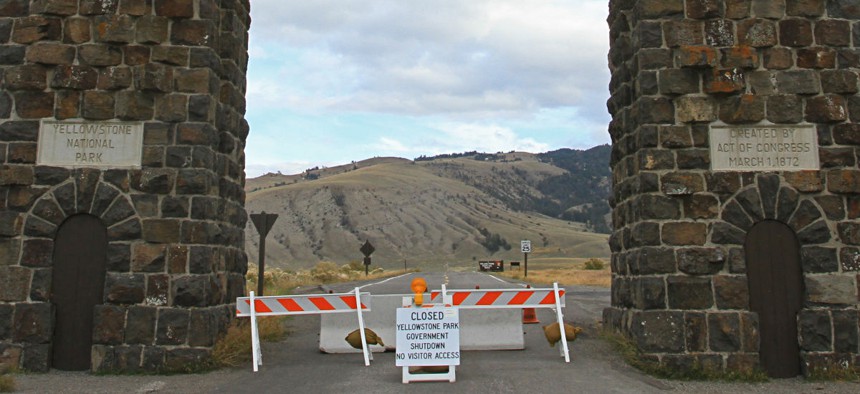
Flickr user Yellowstone National Park
Contractor Back Pay Bill Advances, Administration Seeks Dismissal of Shutdown Compensation Lawsuit and More
A weekly roundup of pay and benefits news.
Some federal contractors who missed work because of the 35-day partial government shutdown earlier this year soon could see compensation for the time they were forced to stay home.
The House on Wednesday was set to begin consideration of its second minibus spending package, which includes appropriations for the Labor, Health and Human Services, Education, Defense and State departments. That bill (H.R. 3055) also includes a provision that would provide back pay to low-wage government contractors who were furloughed or laid off as a result of the lapse in appropriations that began last December.
During the shutdown, contractors who worked at unfunded agencies’ facilities, such as security personnel and custodians, were furloughed or laid off. Unlike federal employees, they did not receive back pay when the government reopened.
The provision of the spending package would provide back pay to those employees, and order the restoration of paid leave if a contractor required employees to use leave during the shutdown. The bill caps compensation on a weekly basis at what an employee’s pay would have been or $965, whichever is lower.
The White House has signaled that it would veto the House minibus legislation, citing a variety of policy disputes and areas where it is inconsistent with President Trump’s fiscal 2020 budget proposal. The Office of Management and Budget stated that the administration also opposes the contractor back pay provision, arguing that implementation would be a logistical nightmare.
“While contractors play an important role in helping government agencies meet their missions, this legislation ignores important principles of federal contracting, and would lead to increased cost and a significant increase in the risk of fraud, waste and improper payment,” OMB wrote. “The administration anticipates significant, disruptive and costly challenges in trying to force-fit the requirements of contractor back-pay legislation into an acquisition system that is not designed or equipped to manage contractor employees.”
Last month, attorneys with the Justice Department filed a motion to dismiss a class action lawsuit filed by federal employees seeking damages related to delayed paychecks as a result of the shutdown. In January, more than a dozen feds and labor groups filed lawsuits accusing the government of violating the Fair Labor Standards Act, which requires employers to pay employees promptly for the work that they perform.
In the motion filed May 3, the Justice Department argued that the government “fully complied” with its payment obligations, noting that federal agencies are bound by the Anti-Deficiency Act not to pay workers during a lapse in appropriations.
“[Plaintiffs] do not dispute that federal officials were statutorily barred from compensating them for that work while the lapse in appropriations persisted,” attorneys wrote. “Plaintiffs also do not dispute that, once appropriations were restored pursuant to ‘the enactment of [a spending bill] ending the lapse,’ the government fully compensated plaintiffs ‘at the earliest date possible.’ ”
Despite the motion to dismiss the lawsuits, which were consolidated in February, the plaintiffs are expected to succeed in their challenge. In 2017, a judge awarded financial damages to employees forced to work during the 2013 government shutdown amounting to the federal minimum wage—$7.25 per hour—times the number of hours they worked between Oct. 1 and Oct. 5, 2013, the period during which paychecks were delayed.







